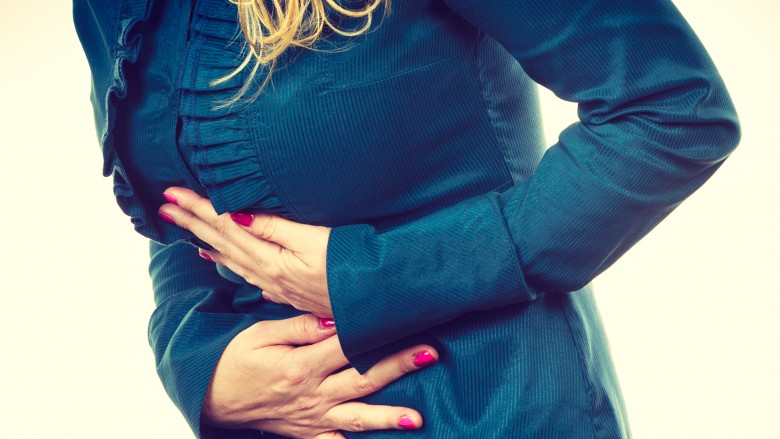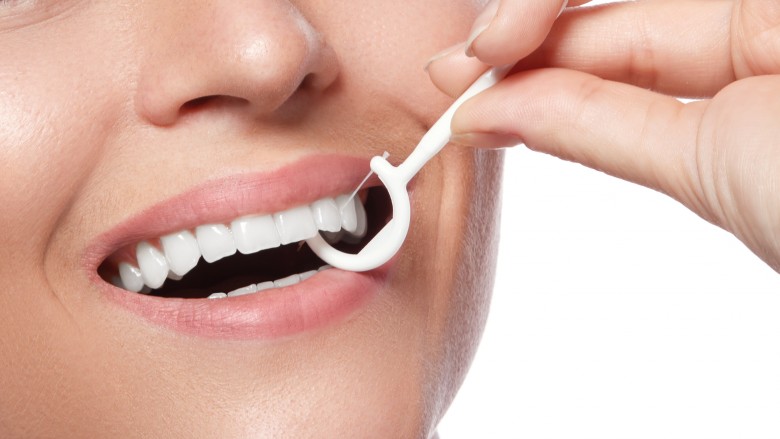What Really Happens When You Stop Flossing
In 2016, a study conducted by the Centers of Disease Control and Prevention found that one third of American adults never floss. The study author, Dr. Duong Nguyen, told CNN that he believed the reason for this statistic is because flossing is something people are told to do, without much explanation as to why it's imperative to our overall health.
Most people know that they should floss, and that flossing is a good thing for them to do. However, aside from your dental health, did you know that there are a lot of other negative effects that not flossing can have on your body?
"We need to improve health practices and make sure people understand something as easy as flossing can prevent a whole host of other dental issues for you as you age and grow up," says Dr. Nguyen. Perhaps digging in deeper into how not flossing can affect your overall health will emphasize the importance of maintaining good oral health through flossing.
Bad breath
Once, at the dentist, I told my dental hygienist, "I don't floss all the time, but I brush my teeth regularly." I wasn't expecting a pat on the back or anything, but I thought, "At the very least, that's not so bad, right?" Unfortunately, while dentists agree that brushing your teeth regularly is imperative to good dental hygiene, flossing is just, if not more, important — even to prevent something as simple as bad breath.
"Yes, you can still get bad breath if you do not floss," says Dr. Gary Glassman, dentist and world-renowned Oral Fitness expert. "Not flossing your teeth is like only washing the outside of a mug and not the inside." He told me that flossing can leave leftover food and drink around your teeth. Once they begin to harden, it creates a feeding ground for bacteria, and "the longer the bacteria are in your mouth, the more likely it is to cause inflammation and produce a sulfur-like odor."
Dr. Jeffrey Rappaport, general dentist and co-founder of Afora in New York City, agrees. "People don't really know this, but flossing does most of the heavy lifting as far as your dental hygiene routine is concerned. It gets rid of a lot more of the odor-causing bacteria than brushing your teeth does," he tells me.
Are you flossing enough?
How many times a day should you be flossing? The number may differ from dentist to dentist. Dr. Rappaport says that you can floss up to three times a day, after each meal, if you wish. However, according to Dr. Glassman, the average adult should be flossing once a day "to avoid plaque from hardening."
If you're a dental hygiene fanatic, you might be inclined to floss more than the suggested amount. However, too much flossing might not be the best idea, either. Dr. Glassman says that if you floss more than once per day, it can cause serious damage to the gum tissue. If you're about a thorough clean, you don't have to worry too much because, as Dr. Glassman told me, "It's not just how often you floss that causes damage. Flossing too vigorously or applying too much pressure on the gums can cause the gums to bleed." So if you're trying to make sure your teeth are extra clean, just be sure not to apply too much pressure on your gums when you floss.
On the other end of the spectrum, there are those who are not flossing enough. "The number one sign you are not flossing enough is if your gums are bleeding," says Dr. Glassman. "Not flossing enough can cause gingivitis."
Unfortunately, if you're not flossing enough, or at all, gingivitis could be the least of your worries, as you could susceptible to some other pretty nasty stuff.
Diabetes
Extremely poor dental health can be detrimental to your overall health. Dr. Glassman says that if you don't floss, that could be a risk factor for "insulin resistance, or what is sometimes referred to as 'pre-diabetes' and diabetes," mostly because not flossing increases inflammation, and inflammation, according to research, can be a factor in developing diabetes.
If you already have diabetes, however, he says that "many studies have shown that patients who have good oral hygiene may actually improve diabetes control." So remember to floss to aid in keeping control of your diabetes!
Kidney disease
If you've lost teeth in your adulthood, that could be a sign that you're at risk for some more serious health issues. According to Dr. Glassman, adults who have lost all of their teeth as a result of poor oral hygiene are far more likely to suffer from chronic kidney disease than people who have maintained proper oral hygiene through regularly brushing and flossing their teeth. This is because "people who have not taken care of their teeth are more likely to suffer from periodontal disease," he tells me. "If you suffer from periodontitis, it puts you at a much higher risk for kidney disease."
Heart disease
Heart disease is a very serious and potentially life-threatening issue. According to the Center for Disease Control and Prevention, one in every four deaths in the United States are caused by heart disease. If you knew that simply taking care of your teeth and gums could lower your risk of heart disease, would you be more motivated to floss regularly?
Dr. Glassman told me about a recent study which revealed that "healthy gums can decrease plaque build-up, which can cause the narrowing of arteries. Flossing and brushing your teeth regularly is the best way to keep gums healthy."
Ulcers
Ulcers can cause great pain and discomfort. If you're not flossing regularly, or at all, you could be at a high risk of getting one.
Again, periodontitis is the culprit! Surprise, surprise — the disease that results from poor dental hygiene can cause stomach ulcers. Dr. Glassman told me that "Helicobacter pylori is a type of bacteria that can cause stomach ulcers." He says that when you don't floss, plaque can form below the gum line, and "this is just the environment Helicobacter pylori thrives in." Just one more reason to get flossing.
Flossing correctly is key
Conviced you need to floss daily yet? It may seem silly to you, but ask yourself right now, "Do I really know to floss properly?" If you don't know how to floss properly, your efforts make little difference to your dental and overall health. Dr. Rappaport says that flossing properly is actually very simple, "but a lot of people just aren't taught how to do it properly." He told me that he's encountered many adult patients who have been doing it wrong most of their lives.
Dr. Glassman offered these very simple instructions: Gently slide the floss between your teeth. Move the floss in a "C" motion when it makes contact with the gums, and use an up and down motion to clean the area. Repeat the process between each tooth. Don't forget the backs of your rear molars. Sounds simple enough!
What kind of floss should you use?
Now that you've committed to flossing daily, you'll probably want to go out and get some floss — but what kind should you buy?
"Obviously regular floss is great," says Dr. Rappaport. "It gets the job done, if you're using it correctly." However, if using regular floss is challenging (perhaps it hurts your finger tips), he also says that the curved shape floss picks are just as effective as regular flossing because "they're designed to get to all areas of the mouth."
Another great alternative to traditional floss, according to Dr. Glassman, is a water flosser like the Waterpik, which uses water pressure to eliminate left over food particles from between your teeth, much like regular floss.
Go on, get healthy!
Because flossing does the heavy lifting, eliminating food particles that can breed disease-causing bacteria, you should always include it in your dental hygiene routine. "But flossing, unfortunately, just sucks, unless you're doing it every day," says Dr. Rappaport. "If you haven't been flossing regularly for a while, after you start, say, two weeks in, I guarantee that it's going to make a huge difference in terms of pain. Just try and stick to it, and after a while, you'll start to feel a cleaner mouth, and it will be a lot less painful to floss."
Dr. Glassman says that If you forget to floss regularly, create a cue, "like sticking a post-it note to your bathroom mirror. Don't write anything like 'floss' on it, because that sounds too disciplinary." If you leave yourself a note, every time you see that post-it on the mirror, you'll be reminded to floss. He told me that it's a great way to get back into the habit of flossing.
Whatever method you use to remind yourself to floss regularly, just keep in mind all of the benefits of doing so. Flossing not only gives you a better smile, but a healthier body as well.









